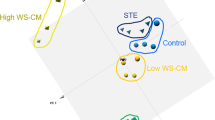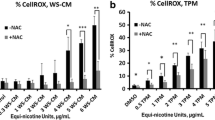Abstract
Exposure to cigarette smoke is known to suppress immune responses and to increase the incidence and severity of respiratory infections. In this study, we determined the effect of hydroquinone (HQ), which is found at high concentrations in cigarette smoke, on interferon-gamma (IFN-γ) production by lymphocytes. HQ significantly inhibited IFN-γ secretion by keyhole limpet hemocyanin-primed lymphocytes in a dose-dependent manner. In addition, HQ inhibited IFN-γ secretion in effector CD4+ T cells and Th1-differentiated CD4+ T cells. The mRNA expression of IFN-γ and the IFN-γ gene promoter activity were inhibited by HQ. These results suggest that the inhibitory effect of HQ on IFN-γ secretion may occur at the transcriptional level. Furthermore, the effects of HQ on transcription factors were investigated. HQ inhibited the transcriptional activity of activator protein-1 and nuclear factor-κB, which are known to be involved in IFN-γ transcriptional activation. These findings provide evidence that HQ might suppress immune responses by reducing the production of IFN-γ and may explain the susceptibility to microbial infections caused by cigarette smoking.
Similar content being viewed by others
References
Dalton, D. K., Pitts-Meek, S., Keshav, S., Figari, I. S., Bradley, A., and Stewart, T. A., Multiple defects of immune cell function in mice with disrupted interferon-gamma genes. Science, 259, 1739–1742 (1993).
David, W. P., Wayne, S. S., and Richard, D. I., Hydroquinone, a reactive metabolite of benzene, inhibits NF-κB in primary human CD4+ T lymphocytes. Toxicol. Appl. Pharmacol., 149, 178–184 (1998).
DeCaprio, A. P., The toxicology of hydroquinone — relevance to occupational and environmental exposure. Crit. Rev. Toxicol., 29, 283–330 (1999).
Farrar, M. A. and Schreiber, R. D., The molecular cell biology of interferon-gamma and its receptor. Annu. Rev. Immunol., 11, 571–611 (1993).
Haynes, W. F., Krstulovic, V. J., and Bell, A. L., Smoking habit and incidence of respiratory tract infections in a group of adolescent males. Am. Rev. Respir. Dis., 93, 730–735 (1966).
Holt, P. G. and Keast, D., Environmentally-induced changes in immunological function: Acute and chronic effects of inhalation of tobacco smoke and other atmospheric contaminants in man and experimental animals. Bacteriol. Rev., 41, 205–216 (1977).
Johnson, J. D., Hauchens, D. P., Kluwe, W. M., Craig, D. K., and Fisher, G. L., Effects of mainstream and environmental tobacco smoke on the immune system in animals and humans. Crit. Rev. Toxicol., 20, 369–395 (1990).
Kalf, G. F., Recent advances in the metabolism and toxicity of benzene. Crit. Rev. Toxicol., 18, 141–159 (1987).
Kim, E., Kang, B. Y., and Kim, T. S., Inhibition of interleukin-12 production in mouse macrophages by hydroquinone, a reactive metabolite of benzene, via suppression of nuclear factor-kappaB binding activity. Immunol. Lett., 99, 24–29 (2005).
Lee, J. Y., Kim, J. Y., Lee, Y. G., Shin, W. C., Chun, T., Rhee, M. H., and Cho, J. Y., Hydroquinone, a reactive metabolite of benzene, reduces macrophage-mediated immune responses. Mol. Cells, 23, 198–206 (2007).
Li, Q., Geiselhart, L., Mittler, J. N., Mudzinski, S. P., Lawrence, D. A., and Freed, B. M., Inhibition of human T lymphoblast proliferation by hydroquinone. Toxicol. Appl. Pharmacol., 139, 317–323 (1996).
Meraz, M. A., White, J. M., Sheehan, K. C., Bach, E. A., Rodig, S. J., Dighe, A. S., Kaplan, D. H., Riley, J. K., Greenlund, A. C., Campbell, D., Carver-Moore, K., DuBois, R. N., Clark, R., Aguet, M., and Schreiber, R. D., Targeted disruption of the Stat1 gene in mice reveals unexpected physiologic specificity in the JAK-STAT signaling pathway. Cell, 84, 431–442 (1996).
Nouri-Shirazi, M. and Guinet, E., A possible mechanism linking cigarette smoke to higher incidence of respiratory infection and asthma. Immunol. Lett., 103, 167–176 (2006).
Ouyang, Y., Virasch, N., Hao, P., Aubrey, M. T., Mukerjee, N., Bierer, B. E., and Freed, B. M., Suppression of human IL-1β, IL-2, IFN-γ, and TNF-α production by cigarette smoke extracts. J. Allergy Clin. Immunol., 106, 280–287 (2000).
Sherrill, D. L., Holberg, C. J., Enright, P. L., Lebowitz, M. D., and Burrows, B., Longitudinal analysis of the effects of smoking onset and cessation on pulmonary function. Am. J. Respir. Crit. Care Med., 149, 591–597 (1994).
Silverman, N. A., Potuin, C., Alexander, J. C., and Chretien, P. B., In vitro lymphocyte reactivity and T cell levels in chronic cigarette smokers. Clin. Exp. Immunol., 22, 285–292 (1975).
Sopori, M. L., Cherian, S., Chilukuri R., and Shopp, G. M., Cigarette smoke causes inhibition of the immune response to intratracheally administered antigens. Toxicol. Appl. Pharmacol., 97, 489–499 (1989).
Swihart, K., Fruth, U., Messmer, N., Hug, K., Behin, R., Huang, S., Del Giudice, G., Aguet, M., and Louis, J. A., Mice from a genetically resistant background lacking the interferon gamma receptor are susceptible to infection with Leishmania major but mount a polarized T helper cell 1-type CD4+ T cell response. J. Exp. Med., 181, 961–971 (1995).
Author information
Authors and Affiliations
Corresponding author
Rights and permissions
About this article
Cite this article
Choi, J.M., Cho, YC., Cho, W.J. et al. Hydroquinone, a major component in cigarette smoke, reduces IFN-γ production in antigen-primed lymphocytes. Arch. Pharm. Res. 31, 337–341 (2008). https://doi.org/10.1007/s12272-001-1161-1
Received:
Published:
Issue Date:
DOI: https://doi.org/10.1007/s12272-001-1161-1




